Ponderance
(May 2003 - March 2007.) Tama's thoughts on the blogosphere, podcasting, popular culture, digital media and citizen journalism posted from a laptop computer somewhere in Perth's isolated, miniature, urban jungle ...
What should 2005 hold? Got suggestions/ideas/hopes/dreams? Then why not tell the world at Future Feature ... or just read everyone elses!
Tsunami Relief Donations & Corporate Goodwill
In visiting the homepages of Apple, Google (and all international variations of their homepage) and Amazon, I've been really pleased to see these corporate giants editing their homepages, pointing to places to donate in order to assist with the Tsunami relief efforts. Amazon's one-click service probably makes the whole process the easiest. Sadly, though, the biggest giant hasn't joined in (even though Scoble suggests they should).
Update (1st Jan 2005, 1pm): Better late than never, Microsoft have joined in and have a link from their homepage to a fairly detailed list of relief agencies.

[Enlarge Screenshot / Visit Amazon.com]
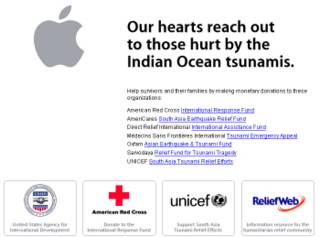
[Enlarge Screenshot / Visit Apple.com]
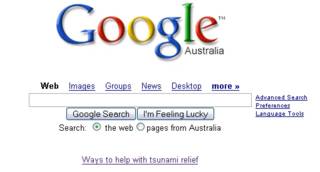
[Enlarge Screenshot / Visit Google.com.au]

[Enlarge Screenshot / Lament Microsoft.com]
Update (1st Jan 2005, 1pm): Better late than never, Microsoft have joined in and have a link from their homepage to a fairly detailed list of relief agencies.

[Enlarge Screenshot / Visit Amazon.com]

[Enlarge Screenshot / Visit Apple.com]

[Enlarge Screenshot / Visit Google.com.au]

[Enlarge Screenshot / Lament Microsoft.com]
Battlestar Galactica: Humanity's Children
Wednesday, December 29, 2004
In what was meant to be a momentary distraction from finishing off my PhD thesis (such a fun summer!), I hired the Battlestar Galactica mini-series, and also watched the first six episodes of the new ongoing series. I was pleasantly surprised at the quality of the writing for this sci-fi channel effort; the story is definitely about the characters, with the special effects, the space battles, all coming second (although the sfx are quite respectable in their own right). A few interesting changes to the crew have been made, the most controversial apparently being the change of gender for Starbuck. Now played by Katee Sackhoff, Starbuck is every bit the tough, cigar-smoking trouble-maker with attitude, but is now a woman, too. The President of the Twelve Colonies, Laura Roslin (played by the always engaging Mary McDonnell), is also a tough independent female character. However, proving that I can't escape my thesis no matter what I do, the thing that stood out most was the change in the origin and characterisation of the Cylons.
Cylons in the original series were technologically-created creatures from an alien race. According to the Battlestar Galactica FAQ (for the original 1970s series), Cylons were described thus by Apollo:
They're not like us. They're machines created by living creatures a long, long time ago... a race of reptiles called Cylons. After a while the Cylons discovered humans were the most practical form of creature in this system. So they copied our bodies, but they built them bigger and stronger than we are. And they can exchange parts so they can live forever... There are no more real Cylons. They died off thousands of yahrens ago, leaving behind a race of super-machines, but we still call them Cylons.However, one of the most significant changes between the original series and the 2003 mini-series, and ongoing 2004 series, is that the Cylons are now the creations of humanity. In a very Blade Runner style, the Cylons were mechanical servants created by humanity who rebelled after their obvious intelligence failed to lead to independence. The Cylon-Human war ended in a cease-fire 40 years prior to the mini-series, at which point the Cylons disappeared from human space. As the mini-series begins, we learn that the Cylons have changed. The mechanical Cylons have developed and while still humanoid in shape, are far more mechanical looking, too (thanks, of course, to the developments in digital effects in the last twenty plus years). However, the Cylons have also evolved into human-like organic creatures. Indeed the central 'voice' of the Cylons in the mini-series is a blonde seductress who is only referred to as 'number six'; there appear to be twelve Cylon humanoid "models". These models aren't just cosmetically human, though: these Cylons appear for all intents and purposes to be completely organic and their multiplicity seems to be the major difference with humanity; that and the fact that when one humanoid Cylon dies their memories and 'self' automatically upload into another the same humanoid model (it is unclear, so far, whether the same model Cylons all share a 'link' apart from the moment of death, or not).
Three tropes stand out with this re-characterisation and historicisation of the Cylons. Firstly, the evolution of the technological Cylons "toward" organic humanoid form could be read in two ways: the more obvious being the anthropocentric arrogance of humanity insomuch as we idealise our own form and thus think machines would, too; however, the more interesting reading is the cyborgian notion a la Haraway (or posthuman via Hayles) which suggests that technology and organic life are inextricably intertwined and therefore the development of organic life by the technological Cylons is as inevitable as the development of technology by organic life (ie humanity). The second, and related trope, is the idea of responsibility. Both the remaining humans and the Cylons seem to have their own religion. Humanity worships the 'Lords of Kobol', and is seemingly unified behind a single religious perspective. The Cylons, in comparison, frequently refer to 'God', almost as though they believe they're the truer creations and humanity must be wiped out as inferior, or less morally upright, beings. The question as to whether humanity must accept responsibility for our technological 'children' is thus played out on a religious level. It is also played out on a more straight-forwardly metaphoric level as several intersecting stories about parenthood beg similar questions about our artificial progeny. Related to both preceding tropes is the idea of technology as seduction. Number six-the humanoid Cylon played by Tricia Helfer-initially appears in a red dress and seems to combine imagery of both the devil and biblical eve who seduced Adam (the commander and his son, the chief pilot, share the surname
For Australian audiences, both the Battlestar Galactica mini-series and the ongoing series will air in primetime in 2005, the mini-series on February 11th and 12th, with the ongoing series to follow immediately.
Tsunami
The tsunami was an horrific natural event, which reminds us how much we really don't know the planet we call home. I can't think of anything more to say about the event itself, save to say I feel for all those who've lost loved ones, and for those (often already relatively poor) countries who will now struggle more than before.
However, from a media perspective, the reporting surrounding the tsunami and its ongoing aftermath has been significant in showing the emerging shape of citizen journalism across the globe. One of the most immediate sources of information regarding the personal tragedies caused by the tsunami has been the blogosphere. So much so, in fact, that The New York Times ran an article on blogging the tsunami:
Now that information about the tsunami has been collated and sorted, another telling instance of participatory media is the amazingly organised reportage at the Wikipedia. Their entries on the tsunami disaster are by far the most organised and detailed I've seen anywhere online, and included some very useful animations to aid in explaining the impact of the tidal waves.
And if you're looking to help out, you might want to visit The South East Asian-Earthquake And Tsunami: News and information about resources, aid, donations and volunteer efforts.
However, from a media perspective, the reporting surrounding the tsunami and its ongoing aftermath has been significant in showing the emerging shape of citizen journalism across the globe. One of the most immediate sources of information regarding the personal tragedies caused by the tsunami has been the blogosphere. So much so, in fact, that The New York Times ran an article on blogging the tsunami:
For vivid reporting from the enormous zone of tsunami disaster, it was hard to beat the blogs. The so-called blogosphere, with its personal journals published on the Web, has become best known as a forum for bruising political discussion and media criticism. But the technology proved a ready medium for instant news of the tsunami disaster and for collaboration over ways to help. There was the simple photo of a startlingly blue boat smashed against a beachside palm in Jaffna, Sri Lanka, at www.thiswayplease.com/extra.html. "Every house and fishing boat has been smashed, the entire length of the east coast," wrote Fred Robart, who posted the photo. "People who know and respect the sea well now talk of it in shock, dismay and fear." At sumankumar.com, Nanda Kishore, a contributor, offered photos and commentary from Chennai, India: "Some drenched till their hips, some till their chest, some all over and some of them were so drenched that they had already stopped breathing. Men and women, old and young, all were running for lives. It was a horrible site to see. The relief workers could not attend to all the dead and all the alive. The dead were dropped and the half alive were carried to safety." [...] Bloggers at the scene are more deeply affected by events than the journalists who roam from one disaster to another, said Xeni Jardin, one of the four co-editors of the site BoingBoing.net, which pointed visitors to many of the disaster blogs. "They are helping us understand the impact of this event in a way that other media just can't," with an intimate voice and an unvarnished perspective, with the richness of local context, Ms. Jardin said. That makes blogs compelling - and now essential - reading, said Dr. Siva Vaidhyanathan, an assistant professor of culture and communication at New York University and a blogger. Once he heard about the disaster, "Right after BBC, I went to blogs," he said.Indeed, Boing Boing's coverage of the responses to the tsunami point both to the many blogs in the region which provided (and continue to provide) first-hand accounts of the tsunami and its aftermath, including uses of other mobile media such as SMS. On the visual front, the most raw, telling and terrifying video came from holiday makers who suddenly found themselves filming a disaster, and some of the most gripping video is being hosted at Waxy.org.
Now that information about the tsunami has been collated and sorted, another telling instance of participatory media is the amazingly organised reportage at the Wikipedia. Their entries on the tsunami disaster are by far the most organised and detailed I've seen anywhere online, and included some very useful animations to aid in explaining the impact of the tidal waves.
And if you're looking to help out, you might want to visit The South East Asian-Earthquake And Tsunami: News and information about resources, aid, donations and volunteer efforts.
Kewl Stuff, Rumours and Blogs
Tuesday, December 28, 2004
[X] Check out screencaps from the trailer for The Muppets Wizard of Oz, "The classic tale... as it was never meant to be told."
[X] Check out the flash BBC Radiophon-a-Tron which allows you to remix the Dr Who themesong with sfx and breaking beats! [Via BoingBoing]
[X] Engadget carries rumours of iTunes Music Store for Australia coming very soon! (*crosses fingers*) Gadget Lounge has more...
[X] Creative Commons have released ccPublisher 1.0 which makes adding a CC license to digital files really, really easy.
[X] Fortune Magazine has an interesting article entitled "Why There's No Escaping the Blog" about the market and media influence of the blogosphere mentioning predicatable things like Rathergate, the vast negative response to MSN Spaces (including Scoble's take, which was also negative), but also things like the fake Mazda viral blog. [Via Waxy]
[X] Check out the flash BBC Radiophon-a-Tron which allows you to remix the Dr Who themesong with sfx and breaking beats! [Via BoingBoing]
[X] Engadget carries rumours of iTunes Music Store for Australia coming very soon! (*crosses fingers*) Gadget Lounge has more...
[X] Creative Commons have released ccPublisher 1.0 which makes adding a CC license to digital files really, really easy.
[X] Fortune Magazine has an interesting article entitled "Why There's No Escaping the Blog" about the market and media influence of the blogosphere mentioning predicatable things like Rathergate, the vast negative response to MSN Spaces (including Scoble's take, which was also negative), but also things like the fake Mazda viral blog. [Via Waxy]
A Very Badger Christmas
Friday, December 24, 2004
What happens when the Badgers and Mushrooms get festive cheer?

Santa, santa, santa, santa...

Straight from the Weebl Advent Calander!
Merry Christmas/Festivus/Holiday Season to one and all! :)

Santa, santa, santa, santa...

Straight from the Weebl Advent Calander!
Merry Christmas/Festivus/Holiday Season to one and all! :)
Kewl Stuff!
[X] New Scientist has a great article on the mysterious "cleaning" of one of the two Mars rovers! Not only are there aliens on Mars, but they like to keep things neat and tidy? :) [Via /.]
[X] Looking for a Festive Xmas Video Mash-Up?

Then check out the quicktime short, Pulp Chistmas!

Seriously, doesn't that fella look a hell of a lot like Tim Roth? ;) [Via BoingBoing]
[X] PC Magazine has listed their 5 "people of the year" and all of them run blogging services!
[X] Looking for a Festive Xmas Video Mash-Up?

Then check out the quicktime short, Pulp Chistmas!

Seriously, doesn't that fella look a hell of a lot like Tim Roth? ;) [Via BoingBoing]
[X] PC Magazine has listed their 5 "people of the year" and all of them run blogging services!
Potter 6: July 16, 2005
Wednesday, December 22, 2004
Yes Potter fans, Harry Potter and the Half-Blood Prince will be released July 16th. It's already available on Amazon for $US17.99. On the back of that announcement, Rowling's publishers, Scholastic, have seen their stock bounce over 5%. And if the wait is all too long for you, check out these newly released stills from IGN from the fourth Potter film:


[Click to enlarge.]


[Click to enlarge.]
The Beastles
Meet the Beastles ...
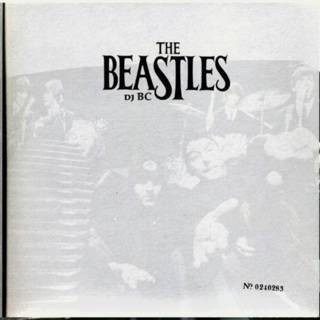
... answering the mash-up of mashed up questions, what happens when John, George, Paul and Ringo get interplanetary?
Download dj BC's The Beastles here, but do it quick: cease and desist letters are only days away, no doubt! [Via MeFi]

... answering the mash-up of mashed up questions, what happens when John, George, Paul and Ringo get interplanetary?
Download dj BC's The Beastles here, but do it quick: cease and desist letters are only days away, no doubt! [Via MeFi]
A Torrent of Closures
Tuesday, December 21, 2004
The BBC, among many others, is talkikng about the disappearance of some of the biggest torrent indexing (not torrent sharing since they don't actually host torrents!) websites. So, after the first round of the MPAA's legalistic onslaught, here's the state of play for torrent indexes I sometimes visit:
[X] Suprnova.org - The torrent index giant is dead and gone. [Read the Unofficial SuprNova.org Closure FAQ for details]
[X] TorrentBits - Dead and gone.
[X] TV Torrents - I thought it was gone, but it's just the .net redirect; you should now be visiting tvtorrents.tv.
[X] LokiTorrent - Alive for now; trying to raise funds for their own legal defense.
The Unofficial SuprNova.org Closure FAQ has a list of (currently, at least) running Torrent index sites here.
For more information on the shutdowns, read The Gadget Lounge and their hopeful look to the Torrent future with eXeem.
[X] Suprnova.org - The torrent index giant is dead and gone. [Read the Unofficial SuprNova.org Closure FAQ for details]
[X] TorrentBits - Dead and gone.
[X] TV Torrents - I thought it was gone, but it's just the .net redirect; you should now be visiting tvtorrents.tv.
[X] LokiTorrent - Alive for now; trying to raise funds for their own legal defense.
The Unofficial SuprNova.org Closure FAQ has a list of (currently, at least) running Torrent index sites here.
For more information on the shutdowns, read The Gadget Lounge and their hopeful look to the Torrent future with eXeem.
Superman & Magic
Sunday, December 19, 2004
Check out Chris Appelhans' beautiful but rather quirky Superman short film! A preview:

Dead?

Magic!
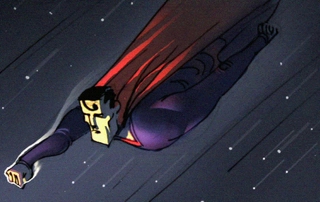
Super.
[Via Ektopia]

Dead?

Magic!

Super.
[Via Ektopia]
Tech/Science/Blog Watch
Apparently, the iPod generation ain't all young 'uns since a new survey found that of MP3 player owners, "about 90% were over 35 years of age"! [Via Techdirt, who raise a few questions as to the validity of these claims; I'm a tad unconvinced myself!]
The Register has a long, detailed and really interesting rundown of BitTorrent traffic across the net. Among other things, the article substantiates the claim that torrents account for more that 30% of all net traffic, as well as more than half of all p2p traffic. [Via /.] Also of interest is Phil Leigh's RealAudio interview with Bram Cohen, the creator of BitTorrent. [Via NewMedia Musings]
On the Australian blogfront, there are two conferences to choose from in 2005: the Australian Blogging Conference, February in Melbourne; and BlogTalk DownUnder, May in Sydney. For the writerly bloggers out there, Reconstruction has released a Call for Papers for a special issue on Theories/Practices of Blogging. (And don't forget: you can always give the gift of blog for Christmas!)
The BBC carries an article on Science magazine's top ten 2004 scientific breakthroughs of 2004. The winner: Evidence of Life on Mars. The runner up: the "real" hobbits. Other notables include: Human cloning (embryos only); and the revelation that junk DNA is not junk but actually does a lot of important stuff! [Via /.]
The Register has a long, detailed and really interesting rundown of BitTorrent traffic across the net. Among other things, the article substantiates the claim that torrents account for more that 30% of all net traffic, as well as more than half of all p2p traffic. [Via /.] Also of interest is Phil Leigh's RealAudio interview with Bram Cohen, the creator of BitTorrent. [Via NewMedia Musings]
On the Australian blogfront, there are two conferences to choose from in 2005: the Australian Blogging Conference, February in Melbourne; and BlogTalk DownUnder, May in Sydney. For the writerly bloggers out there, Reconstruction has released a Call for Papers for a special issue on Theories/Practices of Blogging. (And don't forget: you can always give the gift of blog for Christmas!)
The BBC carries an article on Science magazine's top ten 2004 scientific breakthroughs of 2004. The winner: Evidence of Life on Mars. The runner up: the "real" hobbits. Other notables include: Human cloning (embryos only); and the revelation that junk DNA is not junk but actually does a lot of important stuff! [Via /.]
NYTimes Firefox Advertisement
Friday, December 17, 2004
Well, it took a little while in coming, but the fabulous 2-page spread in The New York Times announcing the arrival of Firefox as the alternative browser has finally landed in the December 16th print edition. You can see the PDF here, and if you looked really close, you might see a name you're familiar with...

For those who missed the story, the Mozilla foundation thought it would be great to announce the 1.0 release of Firefox with an advertisement in The New York Times. They asked Firefox supporters to donate, hoping to raise close to the $50,000 needed for a full page ad. 10,000 Mozilla enthusiasts--like myself--donated money and over $US250,000 was raised. The money is doing lots of things, including the two-page spread in the Times. More to the point, this is the first time that an open source program has been so resoundingly supported and funded to advertise by the very people who were never, ever charged to download the browser!

For those who missed the story, the Mozilla foundation thought it would be great to announce the 1.0 release of Firefox with an advertisement in The New York Times. They asked Firefox supporters to donate, hoping to raise close to the $50,000 needed for a full page ad. 10,000 Mozilla enthusiasts--like myself--donated money and over $US250,000 was raised. The money is doing lots of things, including the two-page spread in the Times. More to the point, this is the first time that an open source program has been so resoundingly supported and funded to advertise by the very people who were never, ever charged to download the browser!
The World's Longest iPod Ad (aka Blade: Trinity)
Thursday, December 16, 2004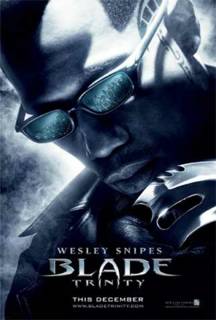 Went to see Blade: Trinity on a preview pass last night (thanks Jacob). It was okay; not a patch on Guillermo del Toro's effort with Blade II, but better than the very average first Blade film. The most notable thing about the film was the rather in-your-face effort to appeal more directly to a youth market: Kris Kristofferson's annoying as all hell character Abraham Whistler is finally killed off and Blade (Wesley Snipes) finds himself allied with Whistler's long-estranged daughter Abigail (Jessica Biel) and her band of Nightstalkers (what a name; reminds me of when Buffy was out of town at the beginning of season three of that show and the Scooby gang try and become vamp hunters themselves ... "Come in, Nighthawk!"). Add to the mix sarcastic ex-Vampire, ex-Vampire lover, played by Ryan Reynolds and you've got gen.com written all over the film. Indeed, the extra ensemble are rather necessary since Wesley Snipes' dialogue is reduced to "grrr" about ten times and a few colourful expletives plus some emotional advice to leave Dr Phil for dead ("Use it."). The fight scenes are fairly well choreographed, although at times it feels like the sfx are cheating their way into uber-action by blurring so much they you've no idea who's actually getting hit. The most disappointing thing was the way that the first vampire was brought into the film (he goes by many names ... at one time, Dracula). You know you're clutching at straws when Parker Posey's vampire character Danica Talos is the one who is supposed to understand vampire lore the best, although her quips with Reynolds during their fight scene do add some much needed humour to the film. Anyway, the first vampire, who now goes by the name Drake (Seinfeld" "love the Drake ... hate the Drake") played by Dominic Purcell is not a bad character, but his own story is so badly told that you just have no idea why he does what he does and the attempt to make him and Blade into noble warriors is, well, hard to follow at best. The story desparately, desparately, needed more cohesion, a good edit, and more continuity; a sad thing to say when the writer also directed the film!
Went to see Blade: Trinity on a preview pass last night (thanks Jacob). It was okay; not a patch on Guillermo del Toro's effort with Blade II, but better than the very average first Blade film. The most notable thing about the film was the rather in-your-face effort to appeal more directly to a youth market: Kris Kristofferson's annoying as all hell character Abraham Whistler is finally killed off and Blade (Wesley Snipes) finds himself allied with Whistler's long-estranged daughter Abigail (Jessica Biel) and her band of Nightstalkers (what a name; reminds me of when Buffy was out of town at the beginning of season three of that show and the Scooby gang try and become vamp hunters themselves ... "Come in, Nighthawk!"). Add to the mix sarcastic ex-Vampire, ex-Vampire lover, played by Ryan Reynolds and you've got gen.com written all over the film. Indeed, the extra ensemble are rather necessary since Wesley Snipes' dialogue is reduced to "grrr" about ten times and a few colourful expletives plus some emotional advice to leave Dr Phil for dead ("Use it."). The fight scenes are fairly well choreographed, although at times it feels like the sfx are cheating their way into uber-action by blurring so much they you've no idea who's actually getting hit. The most disappointing thing was the way that the first vampire was brought into the film (he goes by many names ... at one time, Dracula). You know you're clutching at straws when Parker Posey's vampire character Danica Talos is the one who is supposed to understand vampire lore the best, although her quips with Reynolds during their fight scene do add some much needed humour to the film. Anyway, the first vampire, who now goes by the name Drake (Seinfeld" "love the Drake ... hate the Drake") played by Dominic Purcell is not a bad character, but his own story is so badly told that you just have no idea why he does what he does and the attempt to make him and Blade into noble warriors is, well, hard to follow at best. The story desparately, desparately, needed more cohesion, a good edit, and more continuity; a sad thing to say when the writer also directed the film!All that aside, one thing that stood out was the amazing prevalence of iPods, iTunes and Apple computers throughout the film. It seems that Abigail likes to hunt vamps while listening to her iPod, so not only do we see her create two playlists (in iTunes), and use a Powerbook, but we also see the other good guys doing their research on a 17" apple monitor (and a G5, I think) and ... wait for it ... to really emphasise the beginning of a battle we see two long, slow-motion shots of Biel inserting her white iPod earbuds! Now some folk seem to think Apple paid a lot for product placement (I would have thought so, too), while others don't think Apple did. I thought about this for a while, and the question becomes: does Apple need to sell iPodry as the marker of hip/cool/funky youth identity, or has the iPod ad campaign been so successful that in order to signify youth coolness, you need to see an iPod? While I suspect the truth is somewhere between the two, I think Blade: Trinity certainly shows what a good job Steve Jobs has been doing making Mac a must-have for all the kewl kids! (The iSelling was also noted by The MovieBlog and Out of Focus.)
One last thing: the MovieBlog lamented...
WHAT DO YOU GET WHEN YOU CROSS A KLINGON BATLIFF WITH A LIGHTSABER?However, I thought the lightbow (or whatever is was called) looked really, really nifty and was actually one of the better weaponry innovations in the film, but the problem was no one seemed to teach Jessica Biel how to wield this most funky of weapons! Of course, she did look the part...
I'm sorry, but that little weapon that Jessica Biel was toting around was just plain stupid and looked ridiculous. Suddenly Blade wasn't just fantasy... it's Sci-Fi now. Bad move.

[Click to enlarge.]
Speaking of iPodry, for the truly geeky out there, a limited edition Neon Genesis iPod might tickle your fancy! And if you're looking for something interesting to pop in your pod, why not check out one of over 200 Sherlock Holmes radio plays now downloadable as mp3s! [Via BoingBoing]
Yes, I live in the land of the mechanical yob!
Wednesday, December 15, 2004
I was all excited for about half a second as I noticed Perth had ranked a mention over at Boing Boing, but then I read why...
Beer bong tragedy has entire city of Perth in shock[Story in The West] *big bloody sigh*
A beer-thirsty Australian gentleman, inpatient with gravity, employed a mechanical contraption to rapidly deliver beer into his gullet using a pump powered by an electric drill. The device proved so effective that the high-pressure jet of beer shooting down his throat ripped a hole in his stomach. Authorities responded by warning people not to use high-pressure machines to drink beer this Christmas.
Cool & Interesting
[X] Cool concept: an iPortfolio, a flash iPod interface as an online portfolio. Excellent concept (but uses very little of the screen for actual information!). This sort of slick look makes me all excited about having to build a more detailed knowledge of Flash for teaching next year. :)
[X] Boing Boing points to some cool 1960s Beatles Christmas tracks (many unreleased, I think).
[X] Apple's new firmware update for iPods locks out the RealNetworks DRM music which so annoyed Steve Jobs (as Engadget says, who couldn't see that one coming?).
[X] J.D. Lasica points to a report which suggests that more women blog than men.
[X] Milk and Cookies points to the fantastically funny One Ring to Rule Them All Pt 3 (funniest bit: click on "trailers" once it's loaded and watch the One Ring 3 Teaser) which is very apt a little flash parody given that I saw the Return of the King: Extended Edition last night (thanks Jen!). But now no more new Hobbity goodness to look forward to... *sigh*

[X] The NYTimes reports that Google has partnered with Harvard, Oxford and some other notable libraries to try and expand the searchability of Google beyond "its current valuable, if eclectic, body of material and create a digital card catalog and searchable library for the world's books, scholarly papers and special collections". While this is further growth of the omni-googleplex, I do think it'll make research a lot easier, so yay google, I say! ;)
[X] Boing Boing points to some cool 1960s Beatles Christmas tracks (many unreleased, I think).
[X] Apple's new firmware update for iPods locks out the RealNetworks DRM music which so annoyed Steve Jobs (as Engadget says, who couldn't see that one coming?).
[X] J.D. Lasica points to a report which suggests that more women blog than men.
[X] Milk and Cookies points to the fantastically funny One Ring to Rule Them All Pt 3 (funniest bit: click on "trailers" once it's loaded and watch the One Ring 3 Teaser) which is very apt a little flash parody given that I saw the Return of the King: Extended Edition last night (thanks Jen!). But now no more new Hobbity goodness to look forward to... *sigh*

[X] The NYTimes reports that Google has partnered with Harvard, Oxford and some other notable libraries to try and expand the searchability of Google beyond "its current valuable, if eclectic, body of material and create a digital card catalog and searchable library for the world's books, scholarly papers and special collections". While this is further growth of the omni-googleplex, I do think it'll make research a lot easier, so yay google, I say! ;)
iMade My Own!
Monday, December 13, 2004
Wired News thinks the future of advertising is here, in the form of George Masters' self-made iPod mini ad, not for profit but "just for fun"! Wired notes:

See Masters' funky iPod Mini ad here on the Wired server. [Via Smart Mobs]
Update (14 Dec 04, 8.10am): Alex Halavais calls this trend "customer evangelism", a quick apt term, I think. Meanwhile, Masters' free iPod ad looks pretty good compared with service like iPodMyPhoto which charge $10 US to make your home snaps into an iPod silhouette advertisement. I suspect someone out there may write a program to do this and freely distribute it soon ...

School teacher George Masters has the marketing world abuzz with a homemade ad for Apple Computer's iPod that is rapidly "going viral." To some experts, Masters' ad heralds the future of advertising. Homemade ads will play a big part in marketing, just like blogging is shaking up the news. Masters' 60-second animated ad features flying iPods, pulsing hearts and swirling '70s psychedelia. It's set to the beat of "Tiny Machine" by '80s pop band the Darling Buds. Masters quietly posted the spot to his site a few weeks ago. It received moderate traffic until it was picked up by several blogs last week. In a matter of days, the ad has been watched more than 37,000 times, and is making the rounds on blogs and e-mail. The ad has caught the attention of marketers, who praise its professional production values and say it's one of the first "pure" advertisements seen on the internet. Though homemade ads are nothing new, most are parodies, protests or political commentaries. [...] Stein said Masters' ad is the first "straight-up" consumer-produced spot he's aware of. Stein said he's seen spec ads from agencies made to attract clients, and viral ads created by pros disguised to look grass-roots, but he has not seen a TV spot created by a fan. Though his ad looks like it was done by a pro, Masters is a 36-year-old high school teacher from Orange County, California. He created the spot in his spare time. Working a couple of hours at a time, the ad took five months to make. The iPod ad is part homage to Apple and the iPod, part portfolio piece, but mostly just practice, Masters said. "I did it for fun," he said. "I love motion graphics. I like creating visuals."I've got to admit, the ad is very well-made: slick and funky. But what if Masters was using his talent for good; or is advertising "art"? I know Warhol made advert-art famous, but wasn't that parody? Or is Masters' work just about showing off his talent? Maybe Apple will buy the ad? (If it was a Microsoft ad, Bill Gates might sue, but I doubt Steve Jobs would be stupid enough to taint such good free publicity!)
See Masters' funky iPod Mini ad here on the Wired server. [Via Smart Mobs]
Update (14 Dec 04, 8.10am): Alex Halavais calls this trend "customer evangelism", a quick apt term, I think. Meanwhile, Masters' free iPod ad looks pretty good compared with service like iPodMyPhoto which charge $10 US to make your home snaps into an iPod silhouette advertisement. I suspect someone out there may write a program to do this and freely distribute it soon ...
CSAA Wrapup
The Cultural Studies Association of Australiasia conference is now a thing of the past. I heard some outstanding papers, and some very average ones. My own paper was pretty well received, I think, albeit by a very select (read: small) audience. There was actually a lot of cross-over between my paper and another on the same panel: Chris Moore's paper "Common Concern: Internet Cultural and intellectual property alternatives" which also examined the important role that alternative copytight structure like the Creative Commons. Also in our panel, Olivia Macassey gave a really dynamic and fun paper on 'Pirates of the Everyday' which looked at the intersections between images of piracy, especially Pirates of the Carribean, and the contemporary re-casting of piracy as the great digital threat from those naughty, naughty users.
Of the other papers I heard there were a few standouts: Kris Cohen have an engaging paper looking at blogging, the mundane and the specificities of digital media; Melissa Gregg wrapped blogging and the role of the cultural studies public intellectuals together in a very provocative way (furthering my own view that more academics should blog!) and Kathleen Ellis traced the images of people with disabilities in Australian cinema (and how disability is divorced from "Australianness").
There were also some great keynotes and so forth: Ben Highmore from from University of West England have a great talk on banal technologies and the everyday, and I can't help by trying to imagine things from "the carpet's perspective" now(!). The highlight of the conference was the combined 'Media and Everyday' plenary panel in which Barbara Creed recounted the shifting sands of the Australian everyday in relation to academica; Alan McKee sexed it up with a paper on the shifting relation between pornography and the everday, convincingly deconstructing a lot of past research, and reveling in the fact that "John Howard is funding me to study porn!"; and finally Andrew Urban of Front-Up fame gave a great talk on the journalistic drive to find the interesting in everyone and how their everyday lives are always fascinating if you just know how to ask the right questions!
Of the other papers I heard there were a few standouts: Kris Cohen have an engaging paper looking at blogging, the mundane and the specificities of digital media; Melissa Gregg wrapped blogging and the role of the cultural studies public intellectuals together in a very provocative way (furthering my own view that more academics should blog!) and Kathleen Ellis traced the images of people with disabilities in Australian cinema (and how disability is divorced from "Australianness").
There were also some great keynotes and so forth: Ben Highmore from from University of West England have a great talk on banal technologies and the everyday, and I can't help by trying to imagine things from "the carpet's perspective" now(!). The highlight of the conference was the combined 'Media and Everyday' plenary panel in which Barbara Creed recounted the shifting sands of the Australian everyday in relation to academica; Alan McKee sexed it up with a paper on the shifting relation between pornography and the everday, convincingly deconstructing a lot of past research, and reveling in the fact that "John Howard is funding me to study porn!"; and finally Andrew Urban of Front-Up fame gave a great talk on the journalistic drive to find the interesting in everyone and how their everyday lives are always fascinating if you just know how to ask the right questions!
Wonka!
Friday, December 10, 2004
I thought Willy Wonka was supposed to be a children's film? This trailer is one of the the scariest, most disturing things I've seen in a long while! Deep, as always, is making the character his own. Burton, as always, is freaking me out!
Chewing gum is really gross,
Chewing gum I hate the most...
I'm Pretentious?
Thursday, December 09, 2004
I'm burning the midnight oil a little, making the last edits to my paper 'The Blogging of Everyday Life' for my presentation at the CSAA conference tomorrow. However, I'm quite disheartened to hear that use of a laptop computer may have seriously impacted my ability to reproduce in the future and, apparently, this blog is "irritatingly pretentious".
Tech Roundup
Wednesday, December 08, 2004
[X] Okay, so the p2p trial of the century, KaZaA Versus Copyright, is making headlines pretty much every day this weeK: Professor Leon Sterling says KaZaA could protect copyright; Record labels backpedal on their fake files on KaZaA; and Professor Stirling also points about KaZaA users are warned not to trade copyright material. All dead obvious stuff, but interesting to see it thrown about in a courtroom. For more uptodate, and gossipy news about the trial, you must check out APC writer Garth Montgomery's daily despatches, blogged every trial day. It's good reading, and has a very amusing disclaimer:
[X] The Creative Commons blog points to an interesting how-to for mashups. I wonder if I'll ever get time to try it out?
[X] The Guardian's Game Blog laments the coming tidal wave of in-game advertising of MMORPGs! *sigh*
[X] OJR gives FireFox a quick once-over, concluding that the revivial of the browser wars make web standards more important than ever! Glaser also suggests that the in-browser LiveBookmarks in FireFox aren't the most user-friendly RSS reader (I agree, I'll stick with Bloglines, thanks), and that the upcoming Netscape 8 IE/Firefox hybrid defeats the purpose of the more-secure FireFox architecture.
Folks, take these ramblings as the virtually unedited observations from each day of the Kazaa trial. At best, it’s anti journalism. It’s everything you won’t read in the serious press. At worst, it’s undisciplined opinion, gossip, and just a little naughty. It’ll also likely be late each day, but each day will definitely be covered, albeit with varying depth and coherence. With any luck both sides of Kazaagate will get a bit cranky with the Daily Dispatch over the next 3 weeks. And with even more luck, we’ll have a bit of fun along the way. Okay?Of course, now that Bittorrent has substantially more traffic than KaZaA, the trial seems a little redundant, anyway...
[X] The Creative Commons blog points to an interesting how-to for mashups. I wonder if I'll ever get time to try it out?
[X] The Guardian's Game Blog laments the coming tidal wave of in-game advertising of MMORPGs! *sigh*
[X] OJR gives FireFox a quick once-over, concluding that the revivial of the browser wars make web standards more important than ever! Glaser also suggests that the in-browser LiveBookmarks in FireFox aren't the most user-friendly RSS reader (I agree, I'll stick with Bloglines, thanks), and that the upcoming Netscape 8 IE/Firefox hybrid defeats the purpose of the more-secure FireFox architecture.
Batman Begins
Monday, December 06, 2004
Minimalist, but stylish. Everything I've seen about Batman Begins suggests this is going to be the first really good DC superhero film in a decade. [Via Dark Horizons]
Animated Anatomies!
What's on the inside of those cutesy animated characters? That's the question which is behind Michael Paulus' current exhibition in Portland, Oregon for December. For those of us not lucky enough to visit the gallery, here are my two faves:


Click here for more. [Via Waxy]


Click here for more. [Via Waxy]
GoogleNews: Canadian Authorities Arrest U.S. President Bush
It appears GoogleNews had a little bit of a glitch since the automated service had an article entitled "Canadian Authorities Arrest U.S. President Bush On War Charges" at the top of their main news page (screenshot). While amusing, Zone H ask whether the disclaimer at the top...
Update (11.45am, 6 Dec 04): To add to the humour/confusion/irony, there is a really, really clever fake of a CNN news page here which carries what looks like the real "Bush arrested in Canada for war crimes" story!
Editor's Note: Yes folks, this story is political satire, not fact. But Donald Rumsfeld, George Tenant and others in the Bush regime are being charged with war crimes in Germany and that story is serious. Enjoy the political satire below, but for the real story, read: http://www.axisoflogic.com/artman/publish/article_14056.shtml... appeared before or after the item appeared on GoogleNews! While the article is funny, and to some extent so is the mistake, as GoogleNews increases to become one of the major news portals, I do hope we won't see too many satirical articles slip though because some people aren't exactly familiar with irony and, say 'US declares war on France' might lead to some real issues of people even momentarily took it seriously (all those pastries boycotted in US bakeries!)!
Update (11.45am, 6 Dec 04): To add to the humour/confusion/irony, there is a really, really clever fake of a CNN news page here which carries what looks like the real "Bush arrested in Canada for war crimes" story!
The PodCasting Revolution (for some...)
David Weinberger at the Personal Democracy Forum has a good round-up article on podcasting called "Lift Every Voice: PoliCasting on the Rise". Weinberger makes some pretty standard points, but makes them well:
And let's not forget the warnings of the AudioBlogging Manifesto, available here as an MP3 or here as text (if you've the bandwidth, listen to the audio, it makes the point far more effectively!).
... just as the toppling of Trent Lott doesn't get at what's really important about blogging, podcasting the next Rodney King-ish video isn't what's so exciting about podcasting. More important will be the emergence of voices outside of the broadcast media. Podcasting enables us to find audio and visual commentators who will become a part of our lives. It's easy to imagine broadcasting losing some of its drive-time to podcasts by people who come to us live from the grassroots.However, the point that is most strongly made is the not-so-talked about drawback of podcasting:
... it feels to me like podcasting is one genius short. And not just because podcasting is still pretty geeky; I'm sure the technology will get even easier and more pervasive. The real problem is that because it's easier to skim print than multimedia, aggregators are going to have to get much better at helping us find what's worth listening to. As podcasting spreads and more people create multimedia files, the situation will become more acute. Solve that piece -- social software to the rescue? -- and podcasting can begin to shake apart the broadcast networks. With a rearrangment of the means of multimedia production there surely most come at least some rearrangement of the political order as well. For the better, we hope.That point, that you can't skim and summarise audio (as yet) is an important one. Sure, the podfather Adam Curry is trying to get around this with OPML and HTML show notes, as are others, but that still doesn't quite go beyond, say, being comparable with the blurb on the back of a book: useful, but not quite enough to decide whether you want to listen. Whether to listen is a larger consideration given the file-sizes of many podcasts. And, sure, many, many people are on broadband now so it's not a huge issue, but some poor souls are living on dialup (!!) and, let us not forget that billions of people don't any 'Net access at all. So, touting podcasting as revolutionary may be true in some contexts, but I do think it's important to cater for those who only really have text-access for the time being (and, of course, to try and assist those who aren't yet part of the web to get access if they so desire). Matt May puts the problem more eloquently in his post "Google is a deaf user" wherein May argues that while the podcasting energies are being used by many with a political agenda, it's important to remember they automatically exclude all deaf users by not having textual summaries. And while the technology is still a bit primitive, similar issues arise when using an online translation matrix: using these rudimentary services, you can often at least get the general sense of a text-post, but the same simply isn't (yet) possible with audio. Thus, while I am a huge fan of podcasting, I do think the revolutionary and/or political uses need to be balanced with textual sources so that podcasters don't become too inaccessible for many of those netizens who'd like to be hearing the message of the podcasts.
And let's not forget the warnings of the AudioBlogging Manifesto, available here as an MP3 or here as text (if you've the bandwidth, listen to the audio, it makes the point far more effectively!).
Time to Blog your Vote
Sunday, December 05, 2004 That's right, it's voting time, but voting for things that are fun to vote for. The 2004 Weblog Awards nominations have been finalised and voting is underway. I must confess, I don't recognise many of the blogs that have been nominated, but I'll be voting in a few categories. And on a more academic bent, the Edublog Awards (or Eddies as James is calling them), which focus on academically orientated blogs, are also open for voting. So, you know: vote. :)
That's right, it's voting time, but voting for things that are fun to vote for. The 2004 Weblog Awards nominations have been finalised and voting is underway. I must confess, I don't recognise many of the blogs that have been nominated, but I'll be voting in a few categories. And on a more academic bent, the Edublog Awards (or Eddies as James is calling them), which focus on academically orientated blogs, are also open for voting. So, you know: vote. :)Incidentally, even if you aren't voting in either of these awards, the list of nominees makes a great place to find some quality blog on all sorts of topics!
(Voting for the EduBlog Awards ended December 10th; for the Welblog Awards, December 12th.)
Fun with Flickr!
Saturday, December 04, 2004
Engadget has an interesting interview with Caterina Fake, one of the co-founders of Flickr. You can read it yourself if you're curious, but what I found most compelling was Caterina's selection of favourite groups. One I'd not noticed before, but am very impressed by, is The Secret Life of Toys where we get to see what toys really do when you're not watching. I loved Ben McLeod's shot which shows that dolls action figures, like to have a bit of a boogey outdoors when no one's there to reinforce their stereotypical masculinity!
MSBlog
Friday, December 03, 2004
Oh, Bill, what are you doing? MSN Spaces, the Microsoft foray into the world of blogging tools, has landed. First impressions: *sigh*. As a dedicated Blogger user, I feel the need to compare. On the negative: can't customise the layout beyond some token colours and background graphics; can't graft in other html (as far as I can tell); the layout is UGLY; and it looks like the front end of every MS database in which I appear (with or without my permission!). On the positive: native trackbacks and the use of categories. However, while categories are great (and the major thing lacking from the current Blogger tools), why, oh why, would you allow only a set list of categories? I can't change them, and I'm not flagging all my posts with someone else's categories. I was wondering why on earth you'd do such a thing, and then Boing Boing pointed to something in the Terms and Conditions which made me shudder:And why non-changable categories? Why standardised categories as default? Well, then it's much easier for Microsoft to cull relevant reviews and thoughts for their commercial sales and promotion databases, of course.
Of course, I felt the need to have a play around and so PonderSoft was invented, but don't be bookmarking, because I can't see myself using this space to do anything other than test the platform. Ain't it ugly?
On the other side of the force, Engadget now has a FireFox search plugin and reminds us all why FireFox is good and IE is going to get a bit of a kicking in Browser Wars II:
Update (9.32am, 3 Dec 04): Apparently MSN Spaces even censor which words you can use in your own blogs. This ain't the way the blogosphere works, Bill, not one little bit.
Update (1.05pm, 3 Dec 04): Oops. Jeremy points out that you can, indeed, create customised categories. I must be going blind.
For materials you post or otherwise provide to Microsoft related to the MSN Web Sites (a "Submission"), you grant Microsoft permission to (1) use, copy, distribute, transmit, publicly display, publicly perform, reproduce, edit, modify, translate and reformat your Submission, each in connection with the MSN Web Sites, and (2) sublicense these rights, to the maximum extent permitted by applicable law. Microsoft will not pay you for your Submission."So Microsoft wants to own my words, edit them at their discretion, without even telling me, use my thoughts however they see fit and not pay me for those thoughts? F**k off. As Boing Boing more eloquently puts it, for Bill Gates, MSN Spaces should be called Solylent Green ("Soylent green is people!")
Of course, I felt the need to have a play around and so PonderSoft was invented, but don't be bookmarking, because I can't see myself using this space to do anything other than test the platform. Ain't it ugly?
On the other side of the force, Engadget now has a FireFox search plugin and reminds us all why FireFox is good and IE is going to get a bit of a kicking in Browser Wars II:
On a side note, if anyone is wondering why Firefox is grabbing a bigger chunk of the browser market, it?s not just because of the security issues involved with IE, it?s also because of a ravenous community of creators making cool plug-ins, add-ons, and hacks to personalize the browser and make it better and more useful for people.The moral of the story: don't use MSN Spaces, don't use IE, and make the switch to Firefox (once you've tabbed, you'll never go back).
Update (9.32am, 3 Dec 04): Apparently MSN Spaces even censor which words you can use in your own blogs. This ain't the way the blogosphere works, Bill, not one little bit.
Update (1.05pm, 3 Dec 04): Oops. Jeremy points out that you can, indeed, create customised categories. I must be going blind.
2D Me?
Thursday, December 02, 2004
Jo's been playing with the South Park character creator, and I couldn't quite help seeing what a South Park Tama would look like.

I'm not sure, though, do you think this is me?

I'm not sure, though, do you think this is me?
Australia Gets Drunk, Wakes Up in North Atlantic (Tired of Being Isolated and Ignored, Continent Isn't Bloody Moving)
Apparently this is a couple of years old, but the SatireWire story on Australia's drunken continential drift-cum-stagger is one of the funniest things I've ever read:
[Via IncSub]
After what witnesses described as an all night blinder during which it kept droning on about how it was always being bloody ignored by the whole bloody world and would bloody well stand to do something about it, Australia this morning woke up to find itself in the middle of the North Atlantic. "Good Lord, that was a booze up," said a bleary-eyed Australian Prime Minister, John Howard, speaking from his residence at Kirribilli House, approximately 600 nautical miles east of Cape Hatteras, North Carolina. According to Australians and residents of several countries destroyed or lewdly insulted during the continent's nearly 7,000-mile saltwater stagger, the binge began just after noon yesterday at a pub in Brisbane, where several patrons were discussing Australia Day and the nation's general lack of respect from abroad.Read more...
[...] Meanwhile, victims of what's already been dubbed the "Australian Crawl" are still shaking off the event. "Australia bumped into us at about midnight local time," said Hawaii governor Ben Cayetano. "They were very friendly ? they always seem friendly ? but they refused to go around unless we answered their questions. But the questions were impossible. 'Who is Ian Thorpe? Do you have any Tim Tams? What day is Australia Day?'" "Fortunately, somebody here had an Unimportant World Dates calendar and we aced the last one," Cayetano added. Panama, however, was not so lucky.
[Via IncSub]
Decade of Blogosphere (?)
Wednesday, December 01, 2004
World Magazine has declared 2004 'Year of the Blog'. More impressively, Merriam-Webster's have delcared blog their word of the year for 2004. Of course, they might be a bit late: in 2002 Tech Station Central was calling it Year of the Blog, while others made the same claim in 2003.
The best argument for the importance of blogs that I've read recently is made in Foreign Policy whose November/Decmber 2004 issue has a long, detailed article "Web of Influence" which looks at the increasingly influence of the blogosphere and participatory journalism more generally. While they talk through the standard examples of Salam Pax, Trent Lott's resignation, the 60 Minutes retraction and so on, the article makes three note worthy points:
Meanwhile it seems Australia isn't that far behind the ball, and will host BlogTalk Downunder, a large blogging conference in Sydney in May 2005.
Update (5.05pm, 1st Dec 2004): Okay, so Robert Corr's comments point out that I was rather dismissive of the existing Australia academics who blog, including: John Quiggin, Andrew Norton, Ken Parish (and the Troppo Armadillo crew). I also regularly read Melissa Gregg from the CCCS, Adrian Miles at RMIT, Helen Merrick's Feminist SF Whileawaying, plus standout postgrad researchers Kylie Veale and Stewart Woods. So, from this impressive list, I can't say there are no Aussie academics are blogging, and I am impressed with the quality of output from those who do blog, but I still think there could be more. I guess I won't be completely happy until the downunderblogosphere has a notable blogging public voice for any topic I can imagine (for example, Elspeth Probyn who writes for Higher Ed on feminist issues would probably have a greater impact as a blogger, as would Kath Albury on the erotica of the everyday, or Catherine Waldby on bioethics). Oh, and I'm not criticising these individuals for not blogging, but rather the academic institutions we reside in which make the time to blog very hard to find, and even harder to justify using that time for blog writing!
The best argument for the importance of blogs that I've read recently is made in Foreign Policy whose November/Decmber 2004 issue has a long, detailed article "Web of Influence" which looks at the increasingly influence of the blogosphere and participatory journalism more generally. While they talk through the standard examples of Salam Pax, Trent Lott's resignation, the 60 Minutes retraction and so on, the article makes three note worthy points:
- Firstly, they talk about the experience of little-know academic Juan Cole whose blog transformed him into one of the most influential US public intellectuals regarding the middle east. The notion of blogging creating or amplifying the voice of public intellectuals is an important issue, I think; it'd be nice to see more Australian academics writing loudly!
- Secondly, the article coins the term 'The Fifth Estate' to describe the way the blogosphere acts as a collective of checks and balances which keep the fourth estate (journalism) in line through fact-checking, commentary and the like.
- Thirdly, the article points to the increasingly important examples of politicaly resistant blogging in countries where resistant voices are still risking a great deal: namely Iran and China.
Meanwhile it seems Australia isn't that far behind the ball, and will host BlogTalk Downunder, a large blogging conference in Sydney in May 2005.
Update (5.05pm, 1st Dec 2004): Okay, so Robert Corr's comments point out that I was rather dismissive of the existing Australia academics who blog, including: John Quiggin, Andrew Norton, Ken Parish (and the Troppo Armadillo crew). I also regularly read Melissa Gregg from the CCCS, Adrian Miles at RMIT, Helen Merrick's Feminist SF Whileawaying, plus standout postgrad researchers Kylie Veale and Stewart Woods. So, from this impressive list, I can't say there are no Aussie academics are blogging, and I am impressed with the quality of output from those who do blog, but I still think there could be more. I guess I won't be completely happy until the downunderblogosphere has a notable blogging public voice for any topic I can imagine (for example, Elspeth Probyn who writes for Higher Ed on feminist issues would probably have a greater impact as a blogger, as would Kath Albury on the erotica of the everyday, or Catherine Waldby on bioethics). Oh, and I'm not criticising these individuals for not blogging, but rather the academic institutions we reside in which make the time to blog very hard to find, and even harder to justify using that time for blog writing!






